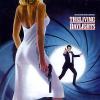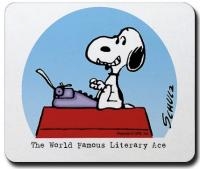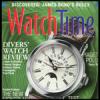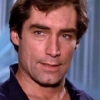Timothy Dalton was the James Bond actor who came closest to the source material
When general audiences think about the James Bond movies, obviously Sean Connery and Roger Moore pop up into their minds. Completely logical of course as before 1986 there had only been one Bond film (though many consider George Lazenby's one and only Bond film On Her Majesty's Secret Service (1969) as the best Bond ever, the movie is not as well known by the public) without either of them. Both were very well known for their different styles of portraying the character. While Connery was more of a irresistible macho man, Moore's performances were generally more light-hearted and humorous.
Timothy Dalton introduced a new Bond to the world in 1987. After seven official Bond movies Roger Moore ended his long-term career as the gentleman spy after A View to a Kill (1985), and it was obvious the franchise needed a new and fresh approach. Welsh actor Timothy Dalton was considered before, back in the sixties, but refused because he found himself too young for the role. Dalton's approach was completely different from the one of his predecessor. He was considerably more serious and less humorous. As a Shakespearean actor Dalton had the advantage of great acting skills to make the character his own.
Although Connery was also a serious Bond, Dalton was more human. In his only two movies The Living Daylights (1987) and Licence to Kill (1989) he expresses lots of human emotions such as worry, frustration, revenge-seeking, love and angriness. In The Living Daylights he witnesses the death of one of his fellow agents, what follows is a moment of blind rage in which he almost attacks a mother and child. In the same movie he finds himself falling in love with a Czechoslovak cello player and stays with her for the entire movie. This is completely in contrast with his predecessors who were more playboy types hitting on different women in one movie. Even more telling is how he leaves the secret service and goes on a personal vendetta in Licence to Kill to revenge the assault on his best friend.
What really makes him the very best of the bunch is that his portrayal is the closest to the character which was described by creator Ian Fleming in the original novels. Not surprisingly Dalton read all 12 Ian Fleming novels and his two collections of short stories before tackling the role. He knew exactly how the character was like and how he should portray him on the big screen. The literary James Bond does not like his job, he doesn't like killing. He drinks, eats and smokes a lot and although he is a snob he doesn't do these things out of decadence but he enjoys such expensive items out of knowledge he has a short life expectancy and he has to savour every moment.
Finally, another important aspect is that Dalton was a very realistic Bond. Not in the slightest possible way because he was a very human Bond. Also because one can notice he is a very physical actor as well. Dalton was eager to do most of the stunts himself, although producer Albert R. Broccoli wasn't very satisfied with that. On a side note it has to be said that one-time Bond Lazenby was also very human and physical. After all, while Connery and Moore had undoubtedly an impact on the cultural influence of the Bond franchise, it were Lazenby and Dalton who can be considered as most faithful to the source material. Ironically they starred in the fewest films of them all.
Cheers,
the Belgian connection





